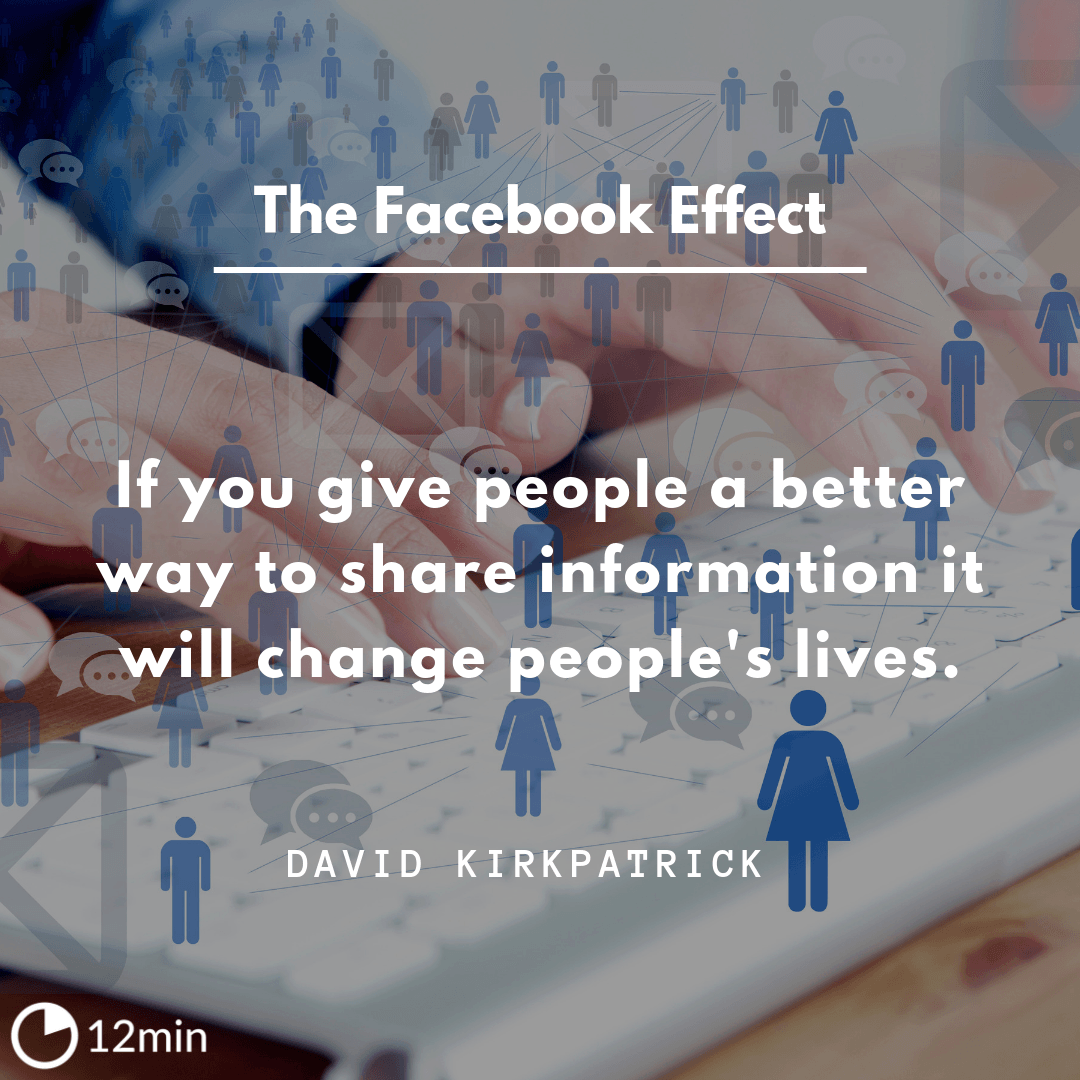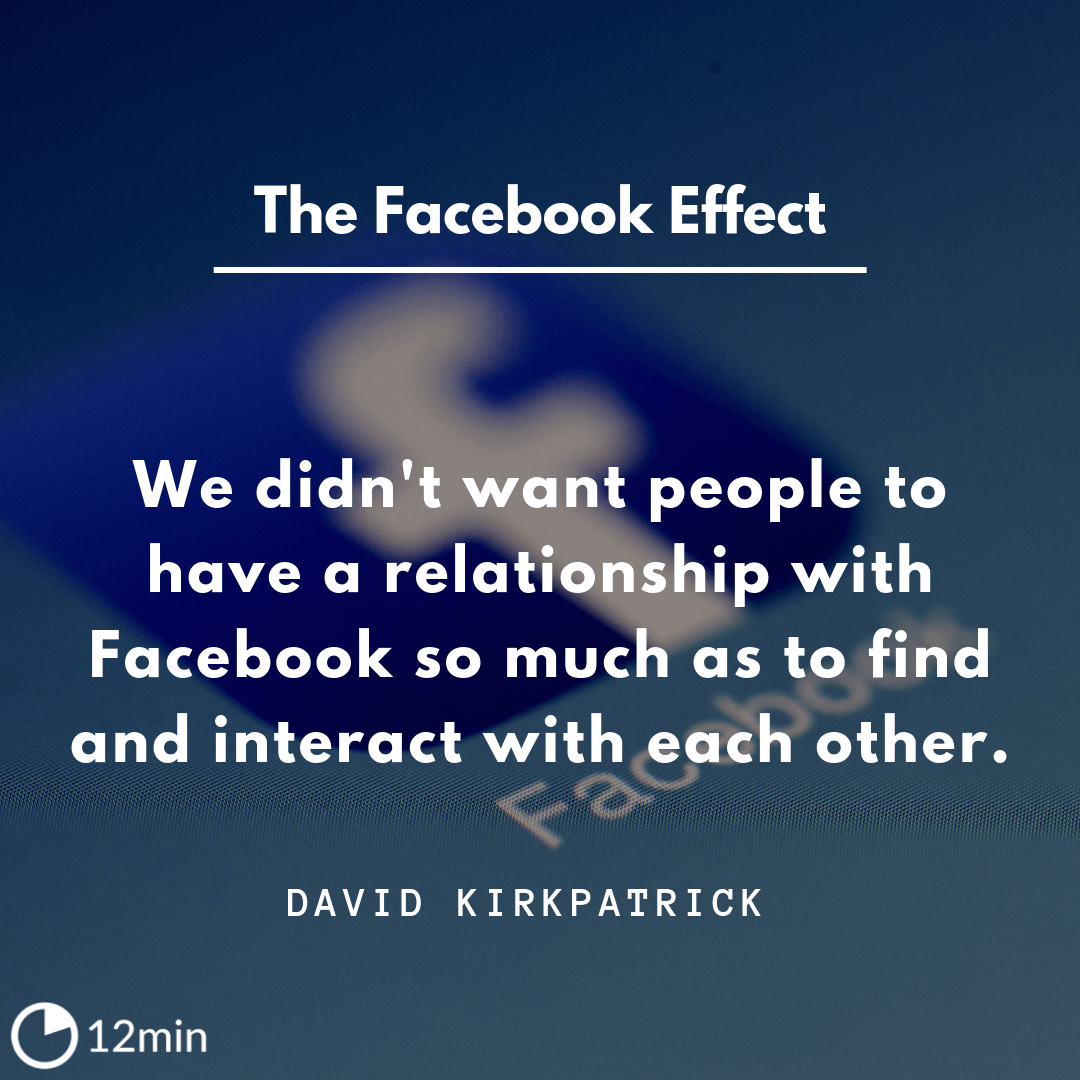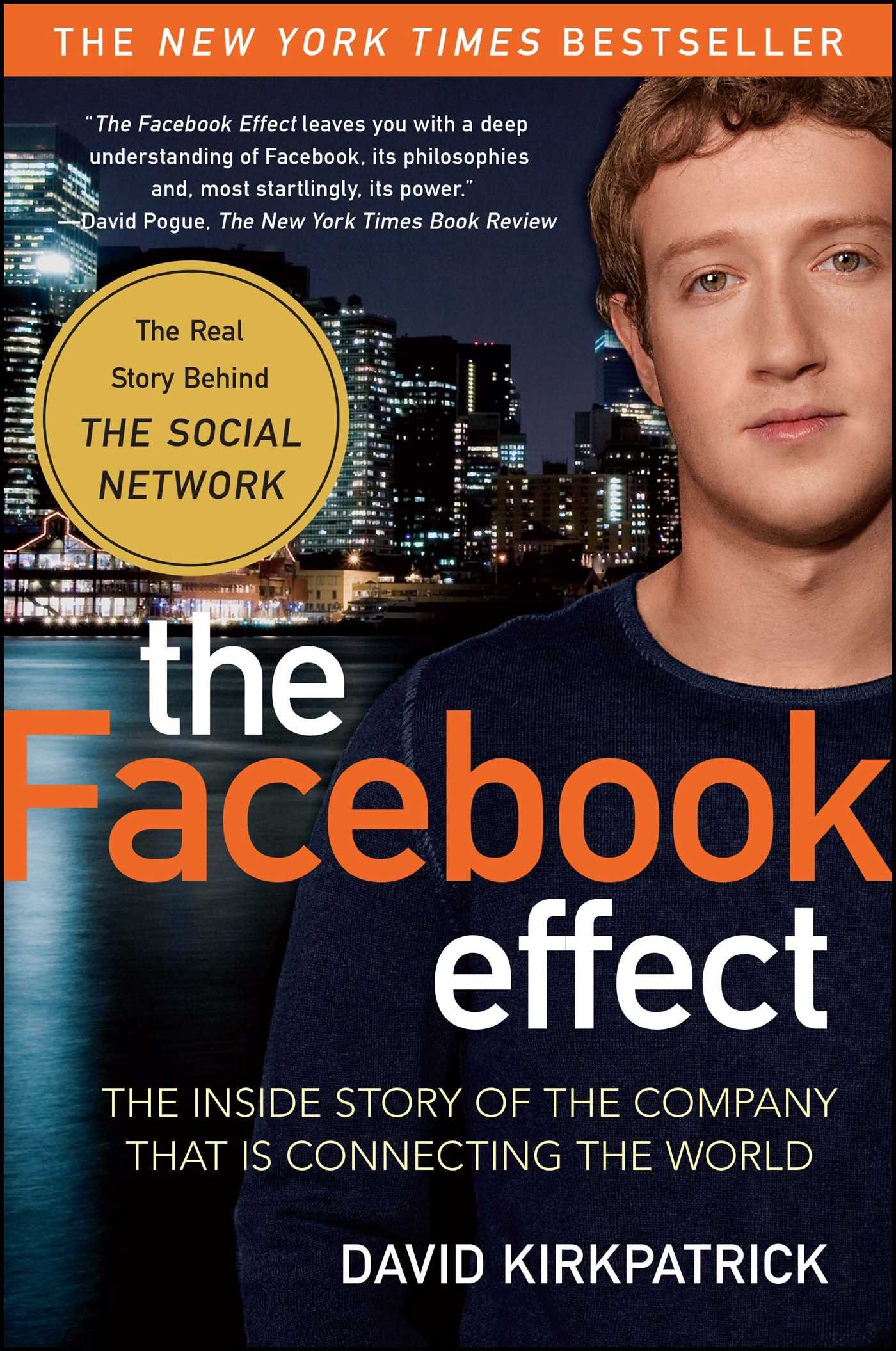The Facebook Effect Summary
8 min read ⌚
 The Inside Story of the Company That Is Connecting the World
The Inside Story of the Company That Is Connecting the World
Day by day Facebook continues to build up its brand, so if the current trend continues, one day every person on this planet will own a Facebook profile.
That’s a pretty good reason to stick with us and absorb this comprehensive outline.
Who Should Read “The Facebook Effect”? And Why?
At this present moment, the platform is translated into 75 different languages, and its outstanding networking service operates in 180 countries across the globe. These facts endorse the theory that Facebook, unlike other companies, has never up to now, lacked funding from investors.
It is intended for all readers who need to learn that Facebook’s vision is not about money, but for growth and prosperity.
About David Kirkpatrick
 David Kirkpatrick is a renowned American journalist, a former editor of Fortune Magazine, writer and an organizer of conferences and seminars related to technology. He was born on January 14th, 1954, in St. Louis, Missouri.
David Kirkpatrick is a renowned American journalist, a former editor of Fortune Magazine, writer and an organizer of conferences and seminars related to technology. He was born on January 14th, 1954, in St. Louis, Missouri.
In 1975 David graduated from Amherst College (degree in English), and he also spent two years studying arts (particularly painting) at the New York Studio.
He became a writer in 1989, and two years later he entirely devoted himself to writing about technology related subjects. Currently, David enjoys his authority and respect, as a result of the development of Fortune’s Brainstorm conference.
“The Facebook Effect PDF Summary”
Facebook is not just an incredibly powerful internet app; it is a platform, a brand created by company’s CEO Mark Zuckerberg – it is a “public utility.” For instance, in 2008 on Jan 4th, a person named Oscar Morales – an engineer by profession created a group on Facebook related to the happenings in Barranquilla, Colombia.
With his action, a word throughout the country has spread; the boldly and opposing Facebook group openly confronted – Colombia’s Revolutionary Armed Forces (FARC) and their terrorist strategies.
The group has received a name that motivated other people – (in Spanish: Un Millón de Voces Contra Las FARC; in English: “One Million Voices Against FARC”). Facebook influence reached everyone within a day.
Approximately, 1,500 people had read and joined the motivation group; and almost 4,000 new users had signed up. Not only that it gave hope, but also Facebook once again endorse its theory, that internet unites us all.
Morales cleverly used the Facebook platform to spread the word and consequently provoke a nationwide uprising against the evil of FARC. What surprised Oscar Morales was the support the group received from users worldwide, who not only wished to march against FARC but also to endorse his policies by marching in their countries.
It took only a month (precisely Feb. 4), before millions of people across Colombia and Latin America joined the revolt against FARC, as did two million more people on a global scale, extending to all four parts of the world. A modern miracle – a simple Facebook community that was created a month earlier by a single entity or a furious member.
If you look the statistics carefully, they indicate that by age 2020 with the current growth rate of Social Media and Internet overall, – Facebook will have at least 3 billion users, globally.
A remarkable success for a Start-up company operating since 2004. The numbers speak for themselves because momentarily, Zuckerberg is among the wealthiest people in the world.
Even though today we have a dozen of successful social media websites, Facebook is without any question (undoubtedly) the world’s No. 1 networking platform.
David Kirkpatrick is a writer and technology expert who currently analyzes the Facebook’s inexplicable success or “The Facebook Effect,” It is an unusual sensation which empowers people to seek for new ways to connect with each other on a global scale.
Facebook is pervasive, with far greater reaching point than any other online medium. The users are excited by the ability to share information with friends and strangers within a second.
Facebook will always make sure that you are well-informed about everything that concerns you and your life. Kirkpatrick explains Facebook’s complicated corporate bio and, even more adequately, examines the real identities of the people involved in its creation, especially the technophile and CEO Mark Zuckerberg.
The author approaches its readers sincerely; it talks about the lives of Facebook’s innovators, their ideas, and hopes of success.
What is more important than a clear vision – you should ask yourself.
With this in mind, a person should follow such a capable leader, learn from him and understand its manners. For that reason, this book concerns everyone, because its influence extends beyond any country’s borders. It literally has no limits.
Facebook started with a simple need, an insight that Zuckerberg figured out quickly and built on it. The Harvard students wanted to have an online directory so that they can find out relevant information about each other. Zuckerberg just realized that an online directory with information uploaded by the users would solve this need. And he built The Facebook.
But before that, and even after, Zuckerberg had been working on several other social networks, such as Facemash or Wirehog.
He felt social networks were the future, but he didn’t know how far this could go. It was not only the favorable context of the Internet evolution and his age, but also his gut feeling and hard work.
I’ll contribute something and give it to someone, and then out of obligation or generosity that person will give something back to me. The whole culture works on this framework of mutual giving.
What most mattered to the success of Facebook was Zuckerberg’s vision along the way. He was never interested in making money, instead, he kept thinking about the most efficient way for people to stay in touch and share relevant information.
This was translated into a very important principle for Facebook – a genuine identity. This fact ensured that each person would upload real information on the profile page.

Having a real identity made it easy for friends to find you and you had no interest to upload fake information about yourself. This is what actually made Facebook so popular, the users’ confidence in the distribution of their data.
Having two identities for yourself is an example of a lack of integrity.
Zuckerberg’s vision of making people interact with each other and not with the website made Facebook simple and easy to use.
It simply expanded to other colleges and then high schools and eventually to anybody. It soon became international and within 5 years it became the most important social network.
At some point, Zuckerberg knew that if Facebook became mainstream, it would change the world the same way the telephone or the telegraph had done.
We wanted to build a new communications medium, we knew we’d be successful when we were no longer cool – when we were such an integral part of peoples’ lives that they took us for granted.
Another key factor in the Facebook’s success is represented by the people around Mark Zuckerberg.
He started everything with his dorm roommates who became his closest consultants and friends, but later on he hired people with experience in similar start-ups or big companies such as Microsoft, Yahoo or Google.
Even if he had quit college in order to grow Facebook, he always looked for valuable persons to join him. The people who worked with helped him to make the right decisions in key moments of the company’s history. At the same time, he always looked for young, smart people. He believed that they were more open and transparent – two core values of the company.
Our mission since day one has been to make society more open.
Facebook is founded on a radical social premise – that an inevitable enveloping transparency will overtake modern life.
Even though Facebook was getting more and more successful, Mark Zuckerberg kept thinking ahead and added new features. So, now you can also find on Facebook features like: News Feed, Facebook Ads or Sponsored Stories.

As he never wanted intrusive advertising that would interfere with the user’s experience, he kept working to redefine ads until he met his objective.
The entire advertising world was redefined as Facebook became stronger. The consumers were the ones who are creating the content instead of the marketers. And a product or service recommended by a friend was much more valuable than any ad.
I don’t hate all advertising. I just hate advertising that stinks. Advertising should always be useful for the user.
Facebook did make history as Zuckerberg wanted because it was designed from the first place for the people and not for the money.
If you don’t have a profile – create it if to be in touch with the new time.
Key Lessons from “The Facebook Effect”
1. Vision, openness, and professionalism
2. A platform which changed the world
3. Popular among young adults
Vision, openness, and professionalism
As Facebook began to expand; the complexity to keep the personal data safe and secure about millions of users suddenly became a pressing matter for the company.
Zuckerberg and his group of professionals were reluctant to shift from transparency to opacity; rest assured that their philosophy is composed of openness and communication.
A platform which changed the world
Since social media platforms experienced a massive financial boom, Facebook invited millions of people across the globe to translate web pages into their native languages.
Currently, Facebook is operating in approximately 180 countries worldwide, so the initiative without any doubt turned out well. The penetration is incredible considering the fact – 2.0 billion people use it daily (around 30% of the worldly population).
Popular among young adults
200,000 new members joined Facebook by the fall in 2004. The platform grew in popularity at lightning speed among students from different colleges across the U.S.
Surprisingly, after Facebook added its immensely prominent “wall” feature, which allows friends (or members) to comment on profiles, popularity reached a new, unexpected level.
What a turn of events for Mark!
Like this summary? We’d Like to invite you to download our free 12 min app, for more amazing summaries and audiobooks.
“The Facebook Effect Quotes”
Mark has the most long-term perspective I’ve ever seen. This guy is uber uber uber on the long-term view. Click To Tweet This thrilled Zuckerberg, whose primary measure of the service’s success was how often users returned. Click To Tweet By early 2004 Tickle had become the second-largest social network after Friendster, with two million members actively connected to others and exchanging messages. Click To Tweet He sent Zuckerberg a letter proposing Viacom would pay $1.5 billion to buy the two-year-old company. Click To Tweet Revenues were, according to well-informed sources, more than $550 million for 2009—up from less than $300 million in 2008. That represents a stunning growth rate of almost 100 percent. The same sources say that the company could exceed $1… Click To TweetOur Critical Review
“The Facebook Effect” is not just an ordinary book. It represents a journey of one ultra-successful start-up company which conquered the world.
David Kirkpatrick managed to come by exclusive pieces of information from reliable sources that will open your eyes to the secrets of “The Facebook Effect.”
Emir is the Head of Marketing at 12min. In his spare time, he loves to meditate and play soccer.


 The Inside Story of the Company That Is Connecting the World
The Inside Story of the Company That Is Connecting the World




